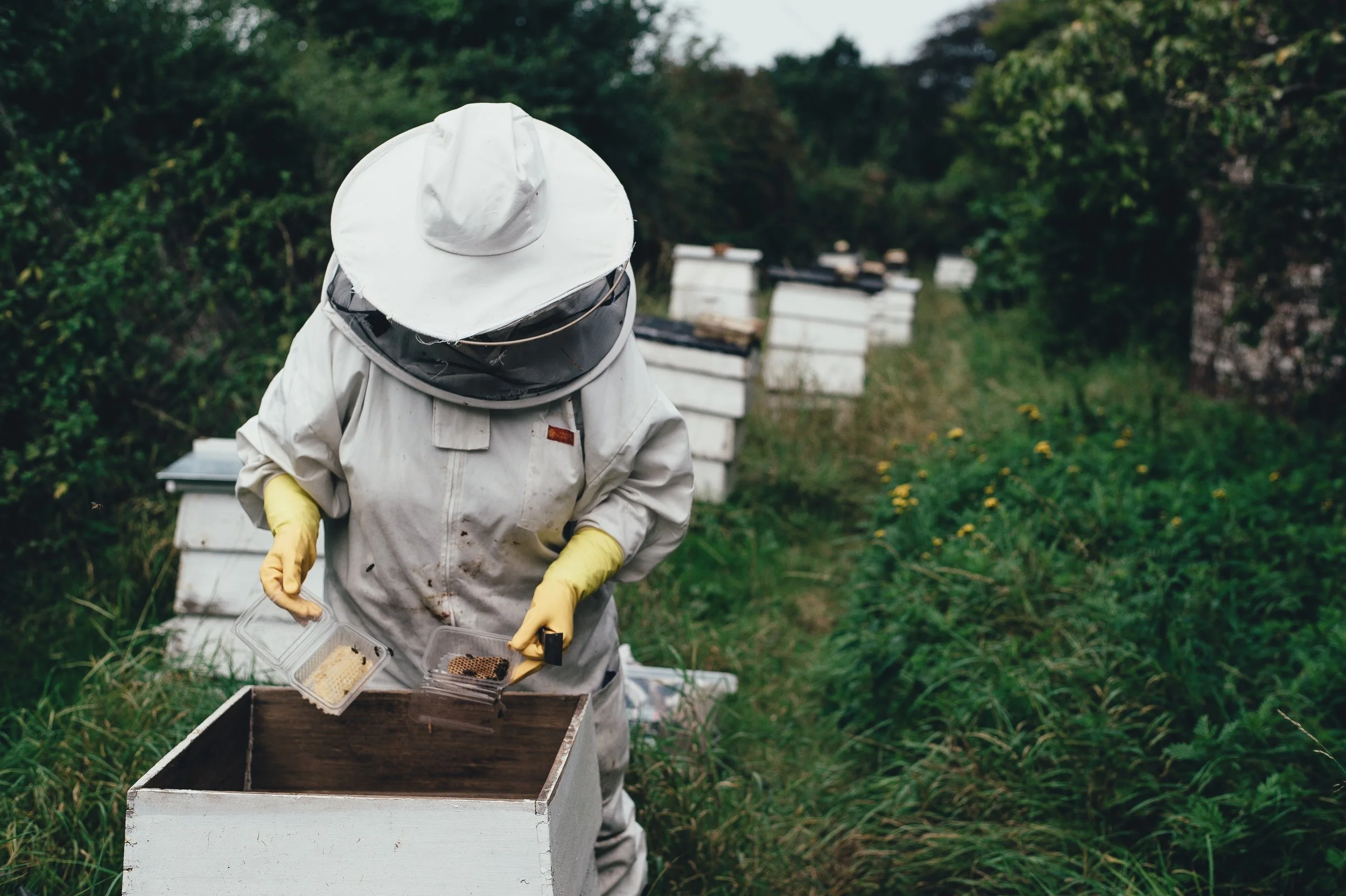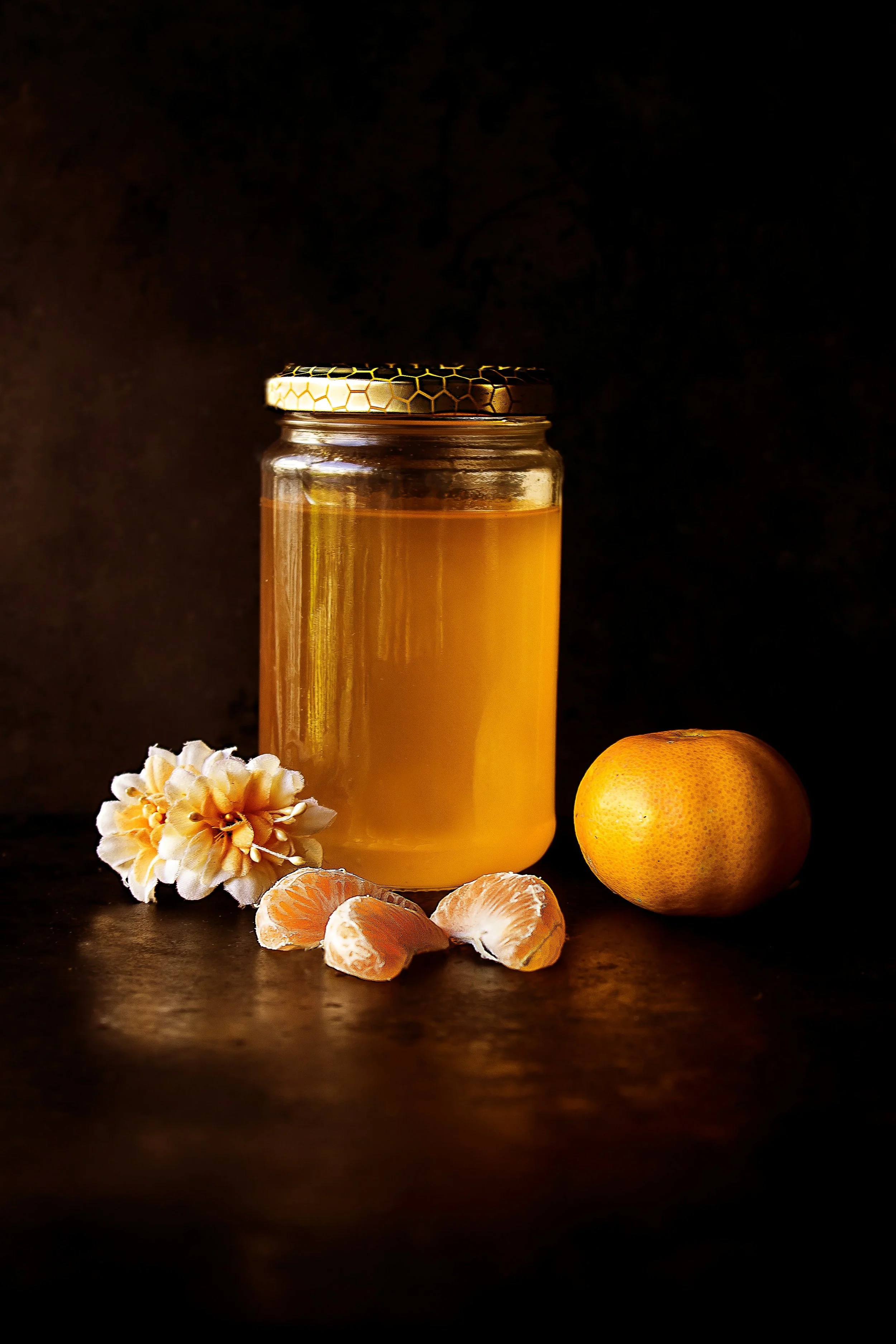The Scoop On Honey
How This Sweet Medicine Is Key To Improving Your Health And The Planet's
Liquid Gold
After many years of sugar-laced honey nut cheerios and an unnecessary fear of bees, my appreciation for honey began after I became an aesthetician specializing in natural skincare. The topical benefits of honey for so many skin conditions and irritations sparked my curiosity, and I began using it in home recipes. After brief research I made sure to buy only the highest quality raw, unfiltered honey from the store.
And then on my birthday this past summer, I received a mason jar full of local wild honey from my boyfriend. Having just polished off the last bit I had gotten from Whole Foods, I immediately could tell that this was the first time in my life that I had ever held true honey in such a pure form. With every turn of my hand, the golden liquid reminded me of childhood kitchens and wooden honey spoons.
Watching the sunny drip of honey has always been mesmerizing to me, capturing its essence of floral energy and age-old medicine.
So here I am, many years later, listening to Ayla Nero’s new album The Code of The Flowers, a day after the spa I work at began carrying local honey products, feeling the buzz in my coffee and the fact that this post is just meant to be.
Nutritional Benefits of Honey
Even though honey provides a large sugar content in the form of fructose, it is different than table sugar because it is a whole food instead of a refined, processed food. It has a lower glycemic index and is much easier for the body to absorb, digest, and metabolize.
For hundreds of years, honey has been found in every medicine cabinet as a folk remedy for various ailments. Pots of honey were even found in ancient tombs within the Great Pyramids- still preserved, and dating back to 3,000 years ago. That is a very long shelf life.
To this day, you still hear about honey and tea as the foolproof combination to relieve a sore throat and nasty cough. It has strong anti-bacterial benefits, and every honey is not alike: the constituents differ based on the region you live and the bees unique source of nectar. Consuming local honey can even help ease allergy symptoms by decreasing sensitivity to pollen in the environment!
In every spoonful of honey, you are digesting various sugars, enzymes, vitamins, amino acids, antioxidants, and minerals (manganese, iron, copper, and zinc in highest amount) as well as pollen and propolis which is gathered from tree sap and used to build hives.
Topical Benefits of Honey
Vulnerary: Much research is being done to support honey as a wound healer, finding it to potentially be even more effective than antibiotic ointments. It is difficult for bacteria to survive in honey due to it’s low PH and high sugar content. The sugar draws out water/fluid from the cellular matrix of bacteria and causes them to essentially cripple up and die. Then, the absence of water within the wound causes a flush of circulation underneath and hydrogen peroxide is released, acting as a natural antiseptic to aid the healing process. It’s interesting to wonder whether or not a higher propolis count in honey would improve its skin healing abilities- If the propolis is a resinous substance from trees which is used to seal the hive together, I am sure it has the same effect on binding skin. Honey’s thick consistency also helps keep the skin moist to prevent tissue trauma and scarring.
Next time you have a burn or abrasion, apply some honey and cover with a gauze dressing or band-aid. You can even add a drop of lavender essential oil to create a lavender infused honey salve.
Facial Care: Due to honey’s moisturizing and anti-bacterial nature, it is a great skincare ingredient for all skin types. My favorite at-home treatment is a DIY face mask using honey and extra virgin olive oil. Simply mix equal parts and apply to the skin for 15-20 mins. You can even add aloe vera or 1-2 drops of essential oils to feed the skin even more. My favorite essential oils for the skin are:
-Helichrysum, Frankincense, Wild carrot seed (all skin types)
-Lavender, Tea Tree, Clary Sage (oily & acneic skin, prone to hormonal breakouts)
-Rose, Neroli, Myrrh (dry or mature skin)
Buying Honey & Supporting A Cause
When looking for the healthiest honey, make sure to avoid store-bought versions which lack nutrients and usually contain high fructose corn syrup. They often go through a long process of pasteurization which uses high heat and filtering to remove all of the good stuff that we now know about!
Visit a farmers market to get your hands on some yummy organic honey produced by bees in or near your area. The National Honey Board also has a Honey Locator online to help you find local sources. As a consumer, your money is your vote for the kind of quality you expect in your food.
it is vital that we support local beekeepers and independent farmers in the fight for a more grassroots healthcare system, where fresh food and medicine is accessible to everyone.
“Honey bees - wild and domestic- perform about 80 percent of all pollination worldwide. A single bee colony can pollinate 300 million flowers each day. Grains are primarily pollinated by the wind, but fruits, nuts and vegetables are pollinated by bees. Seventy out of the top 100 human food crops — which supply about 90 percent of the world’s nutrition — are pollinated by bees.”
SAVE THE BEES
Maryland is the only state so far to ban bee killing pesticides through the Pollinator Protection Act. It will not be implemented until 2018, and certified pesticide applicators, farmers, and vets will still be able to use these pesticides.
By purchasing local organic honey, you are supporting the protection of these beautiful pollinators. The honeybee population has reached scary levels of decline due to the high use of pesticides, industrial agriculture, air pollution, climate change, and destruction of habitat, among other reasons. It is our job as the people to reevaluate what kind of future we want for ourselves and our children. Even though the issues seem unsurmountable and greater environmental strides are needed, it is comforting to know that steps are being made as we become increasingly aware.
So what can we do to help?
Different honey varieties from Waxing Kara's Honey House in Maryland that carries honey from the Eastern Shore. Her honeys and products are sold at The Pearl Spa in Fulton, MD or can be ordered online.
Decorate your yard with bee-friendly flowers and herbs. ( Plant a Bee Garden)
Don't use chemicals and pesticides to treat your lawn or garden.
Buy local organic honey. Supports beekeepers and their sustainable practices.
Don’t be afraid of bees! Don't swat, spray or kill them. They're just checking you out.
Appreciation and Education: Immerse yourself in the beauty of nature. Spend more time outdoors, feed yourself with healthy foods that are full of vital life energy, and read books on similar topics.
Recommended Reading:
The Healing Powers of Honey
A Buzz in the Meadow: The Natural History of a French Farm
Keeping the Bees: Why All Bees Are at Risk and What We Can Do To Save Them







